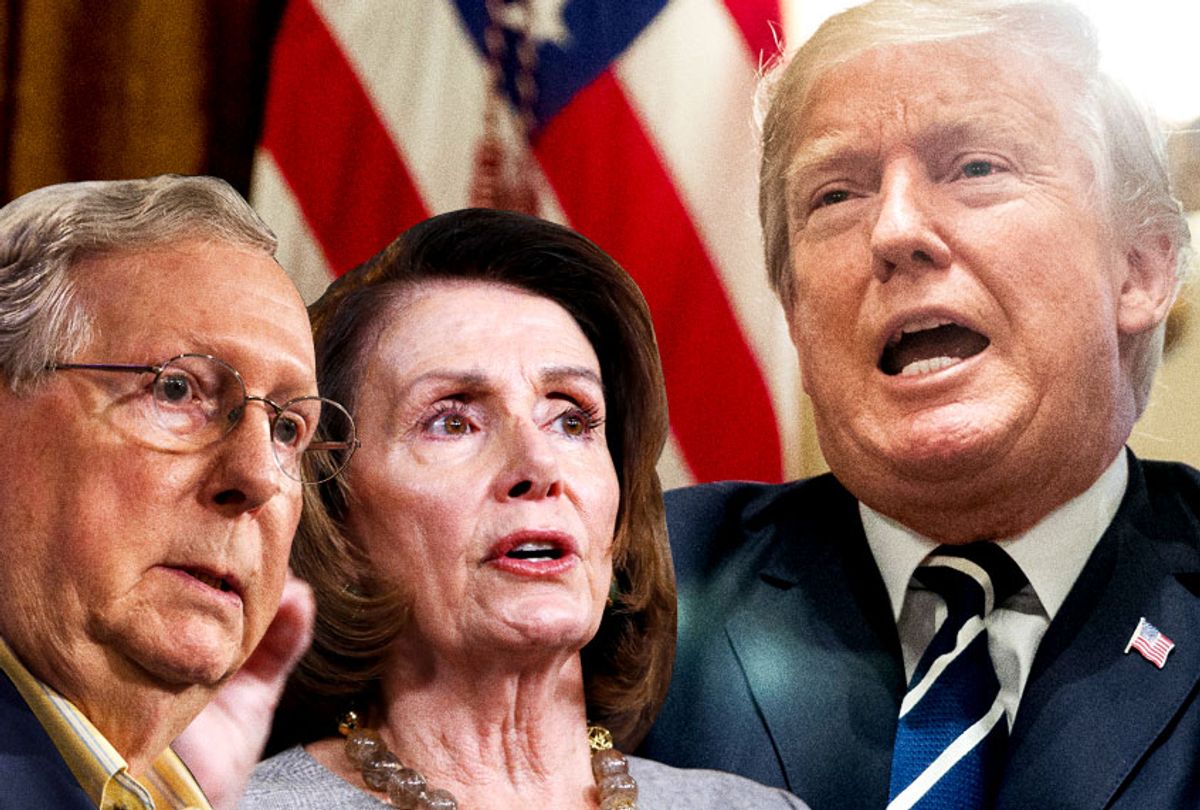Since President Trump took office, the national debt has grown by more than 10%, from just under $20 trillion to more than $22 trillion. Republicans in Congress have already signed off on a spending package that is 18% higher than under the final year of Barack Obama’s presidency, when the GOP railed constantly against the unconscionable rise in debt. Now the Trump White House has crafted a debt-exploding budget deal that will raise discretionary spending by 4% a year. In Obama’s first term, discretionary spending went up by 3%.
Trump’s new debt ceiling deal, announced on Monday, puts the nation on track for another $1 trillion deficit this year that should put an end to the 40-year pretense that the GOP is the party of fiscal restraint.
Even though Trump’s budget deal contains higher defense spending and lower levels for domestic and foreign aid programs —generally in line with Republican priorities — conservatives in Congress are still howling.
Sen. Ted Cruz, R-Texas, said that Trump’s deal "irresponsibly jacks up spending” and “just kicks the can down the road again."
Sen. John Kennedy, R-La., actually suggested he might vote against the deal. “I’ve got a lot of questions about this bill,” Kennedy said on Tuesday. “Now some of my colleagues are sold. And it may taste like pumpkin pie. But I’m not near ready to vote for it.”
Treasury Secretary Steven Mnuchin traveled to Capitol Hill on Tuesday in an effort to quiet Senate Republicans’ concerns about the two-year spending caps and debt limit deal. Mnuchin became chief negotiator of the deal, along with House Speaker Nancy Pelosi, D-Calif., after Trump’s acting chief of staff, onetime South Carolina congressman and House Freedom Caucus founder Mick Mulvaney, was sidelined for blatant hypocrisy. Pelosi and Mnuchin reportedly talked by phone daily for the past week in an effort to secure a deal before Congress leaves for August recess at the end of this week.
Fiscal hawks point to the more than $324 billion added onto existing deficits — a figure that could more than quintuple when spread out over a decade — to oppose suspending the debt limit until July 31, 2021.
Supporters note that the tentative deal includes $75 million in offsets, just half of what White House acting budget director Russell Vought wanted. But the Congressional Budget Office estimated Tuesday that only 17% of the total spending increase can be offset within the first decade.
With nearly equal increases for both defense and non-defense spending programs, the compromise spends far more than what Trump originally proposed for fiscal year 2020, a blueprint that called for nearly $50 billion in domestic spending cuts.
“If President Trump takes this deal — the worst in a decade — his fiscal legacy will be no different than the Obama and Bush administrations that he has criticized,” said Heritage Foundation scholar Paul Winfree, who previously served as a deputy director of domestic policy in the Trump White House.
Another highly influential conservative group, Club for Growth, blasted the budget deal.
“President Trump will be running for reelection with an annual deficit over $1 trillion and without Congress having made any progress on America’s staggering national debt, which exceeds $22 trillion,” Club for Growth president David McIntosh said in a statement. McIntosh suggested Mnuchin had sabotaged Trump.
Conservatives continue to pretend that the deficit and debt are a salient political issue that moves votes, despite all evidence to the contrary. (As Rush Limbaugh recently admitted, most Republican concern over deficit spending was "bogus," or at least highly selective.) At least some House Republicans have threatened to torpedo Trump’s deal.
Rep. Mark Walker, R-N.C., a member of the House Republican leadership who tweeted out a gif of the Joker burning a giant pile of cash, complained, “Our credit card is maxed out.”
Walker wrote on Twitter: “What this budget deal does is ask the credit card company for another $320 billion in credit NOW for the chance to get paid back $75 billion in a decade. No bank would take that. American taxpayers shouldn’t either.”
Rep. Mike Johnson, R-La., head of the Republican Study Committee, said that he talked to the president by phone on Saturday and relayed his concerns.
“There will be a large number of conservatives in the House who will not be able to vote for the deal, if these are indeed the terms,” he told the Washington Examiner.
Johnson rushed to Trump’s favorite cable news network to plead his case.
“We are very discouraged,” Johnson told Fox News’ Neil Cavuto. “We are deeply concerned that many of our colleagues have no regard for the debt or the deficit.”
Rep. Chip Roy, R-Texas, normally a hardcore Trump loyalist, drafted a letter urging the president to “veto this bill because it is fiscally irresponsible."
According to Politico, top Trump allies and members of the hard-right House Freedom Caucus have agreed to sign the letter, including Rep. Matt Gaetz of Florida, and Reps. Andy Biggs and Debbie Lesko, both of Arizona.
“I don’t see any significant support coming from conservatives for the deal that is being outlined in the press,” said Rep. Mark Meadows, R-N.C., a top Trump ally and chairman of the House Freedom Caucus.
"President Trump will have set the record for the largest increases in federal spending in the history of our country, surpassing George W. Bush's Republican record," an unnamed member of the Freedom Caucus told The Hill.
With such a large contingent of Republicans already lined up against a deal directly negotiated by a member of Trump's Cabinet, House GOP leaders are scrambling to decide if they must violate the so-called Hastert Rule. Named for disgraced former speaker Denny Hastert, a convicted felon and admitted child abuser, this is the principle that forbids GOP members from supporting legislation that a majority of Republicans in the chamber oppose. So much for Trump’s art of the deal.

Shares